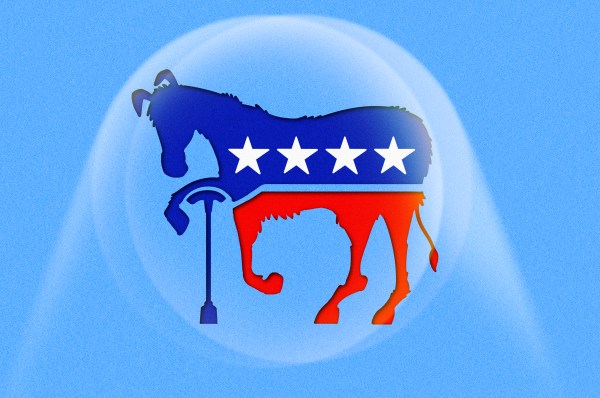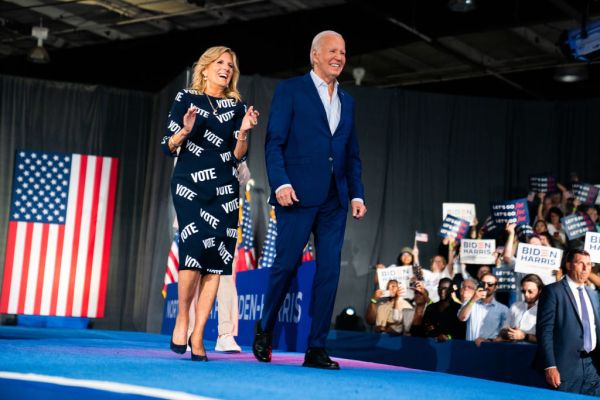“Deserve’s got nothing to do with it.”
That line from Unforgiven keeps popping into my head.
Ignore the context of the scene of course, I’m not interested in retribution or revenge, and I don’t want to shoot anyone in the face with a shotgun.
As we discuss in the editorial we published this week, the Democratic defense of Biden relies heavily—though not exclusively—on the idea that it would be mean, unfair, and not-nice to force Biden to resign or not run again. “Ninety minutes does not negate three-and-a-half years of results” is one of Team Biden’s mantras.
They’re right, of course.
Those 90 minutes cannot “negate” the prior three-and-half-years. For reasons having to do with what physicists call “the arrow of time,” events move in only one direction. There’s no Thanos-snap that can change what has already happened. Spilt milk. The past is in the past. All that stuff.
This would still be true if Biden had an even worse debate performance. If he dropped his pants and sang some Gilbert and Sullivan while smearing lime Jell-O on his crotch, his record would still be his record. It would also be true if he had a great performance: unveiling a cure for cancer, a formula for cold fusion, or offering a cogent explanation of how the TV show Lost actually made total sense.
But that talking point isn’t really about any of that. It’s about emotion. It’s an appeal to loyalty, empathy, sympathy, and feelings. Biden doesn’t deserve this.
Deserve’s got nothing to do with it.
As I discussed in my July 3 column, there are legitimate arguments for why he should stay on the ticket or remain in office. The problem for Biden—and the country—is they aren’t very persuasive.
The most important argument has nothing—or at least should have nothing—to do with partisan politics: “He can do the job” his defenders insist.
I don’t buy it. The other day, CNN’s Jake Tapper did a great interview with Sen. Chris Coons, who has been carrying more water than Gunga Din for Biden since the debate. Tapper made a very simple point. If Biden is up to the job, he could just walk out to the briefing room and hold an impromptu press conference right now. Just do it. That’s it.
If Biden can’t field a bunch of questions from reporters without seeming cognitively impaired, he can’t do the job.
Look, I am first to concede that being president is about more than being able to conduct a press conference. In fact, I think a lot of the performative stuff—including debates—should be given less weight in our politics.
But that’s the point: Being president is about more than just being able to conduct a press conference, in the same way that being a professional basketball player is about more than being able to dribble the ball. If you can’t dribble the ball, it doesn’t really matter whether you can do anything else. (Happy Gilmore was great at hitting the hockey puck, but he couldn’t skate. So he took up golf.) A surgeon needs to be able to do more than make an incision. But if he can’t do that, we don’t need to inquire further about whether he’s qualified to remove an appendix.
Biden is asking the American public for four more years as president. Maybe there are people out there who think he can do that. I don’t know any of them. And I think they’re deluded. So in a very real sense the Democrats are operationalizing a lie agreed upon.
The second argument is that, whatever the extent of his infirmity, he’s still the best candidate to beat Trump. That might be true. I do think Kamala Harris would be a very weak candidate. I’ve said from the beginning that Biden’s first major blunder was picking her as a running mate. I don’t think he needed her to win, and I don’t believe he thought she was the best presidential understudy possible. He picked her for a mixture of subpar reasons. But here we are. She is now a major stumbling block for Democrats who know Biden is a liability.
But I will say this for Harris. She has a major advantage over Biden. She can campaign. She can give interviews. (I think she’s bad at them, but she can do them.) If Biden wants to change people’s impressions of him, he needs to do scads of interviews, town halls, etc. He can’t. Again, if he could, he’d be doing them right now.
In other words, any other Democrat could actually run for president. The best Biden can do is shuffle for president.
Now, I don’t think there are any good options for the Democrats. Sticking with Biden is a terrible option. Kamala Harris is a terrible option. Trying to deal with all of the campaign finance and ballot access issues is a terrible option. Counting on all the players to put their personal interests and ambitions on hold is a terrible option. But if you’re starving to death, and all you have in front of you is moldy bread, wet grass, a moldering dead skunk, and a jar of marmite, you think hard, gird your loins, and eat the bread or the skunk or the grass. Eventually, you may even have to eat the marmite.
As it says in the Talmud, if every dish on the menu is a sh-t sandwich, you pick the one with the smallest portion (I’m paraphrasing).
As I always tell my daughter, there are only two kinds of hard decisions in life: choosing between good options and choosing between bad options. A choice between a good option and a bad option isn’t a hard choice. And if the choice is between marmite or a cheeseburger, it’s not a hard decision.
Politics is political.
But let’s get back to the idea of deserving, because I think it illuminates a more fundamental problem with our politics. You know who else doesn’t deserve to be president? Everyone. Sure, the candidate who wins the most electoral votes “deserves” to be president because those are the rules. That’s a procedural point, not a moral one. And the procedural point doesn’t have anything to do with the way we talk about this stuff.
Harris’ prospects are rising for all the obvious reasons. Some are entirely legitimate. Campaign finance laws make swapping her in the least complicated way to move Biden’s war chest. She’s the vice president and it makes some intuitive sense that she would step in when the president steps aside.
But the arguments on her behalf that get all the play are based on other considerations. She’s a woman. She’s black. It would be insulting to pass her over. I get the political arguments why these things matter. But I think they matter way too much.
Think about it this way. In sports, the winner isn’t the person who works the hardest or wants it more. It isn’t the person who deserved it more because they have a moving personal underdog story. It isn’t even necessarily the most skilled player or team. It’s the player or team that scores the most points. Now, of course, the harder workers and the more skilled players tend to win over time. But not every time. Sometimes the inferior boxer gets in a lucky punch, or the better boxer ate some bad clams the night before. No one would say we need to change the score to make the loser the winner just because he deserved to win or because the fans liked him more. (Indeed, this is precisely the logic the Biden team is unpersuasively invoking when they claim he just had one bad night).
Now, I know politics works differently. Emotion, ideology, group solidarity, cults of personality, and a dozen other things make politics the subject of social science, not hard science. And I wouldn’t have it otherwise. I don’t want a technocracy where we choose political leaders based on test scores or anything like that. Generally speaking, trying to keep politics out of governance is a recipe for despotism or dysfunction.
Regulating politics.
But here’s the thing, politics needs to be regulated. I know that sounds vaguely undemocratic or creepy. But this is an obvious fact. The Constitution is nothing if not a regulatory document (again, read American Covenant). It sets the rules for how politics works. When to hold elections, who is eligible, what the job descriptions are, how to fire people, etc. The Madisonian framework is a regulatory framework.
The Constitution doesn’t establish parties, but its structure creates the necessity for them. And the whole purpose of parties is to really do one thing: Win elections. Sure, other purposes flow from that the same way parties flow from the Constitution. The way you win elections is by building a majority coalition. Once you win, you do the things necessary to maintain or, ideally, expand your coalition. That’s it. You might argue that parties are supposed to do all sorts of other things, protect incumbent members, achieve ideological goals, etc. And sure, you can throw that in there, too. But the limiting principle goes back to the goal of winning elections. If a congressman gets caught with a live hooker or dead boy in his trunk, he has to go—because his continued tenure is bad for the party and maintaining or growing the coalition. Where you draw the lines is a prudential question that involves a lot of politics based on emotions, vibes, whatever.
Here’s where it gets really nuanced.
On one level deserve’s got nothing to do with it. But the perception of whether a politician deserves the heave-ho is vitally important. Voters and coalitional stakeholders care about that stuff because they have a reliance interest in party loyalty and cohesion. So, parties are supposed to stand with their members when they’re in a jam not necessarily because they deserve it, but because a certain amount of loyalty and solidarity is necessary to hold a coalition together.
But the loyalty and solidarity is supposed to go both ways. When politicians indulge their self-interest to the point where continuing to do so harms the party and they fail the cost-benefit test, they’re supposed to get out of the way “for the good of the party.” If they refuse to do so, the party is supposed to throw them overboard.
That’s what the GOP did to George Santos and what the Democrats have been trying to do with Bob Menendez. It’s what the Republicans should have done to Donald Trump a long time ago. And it’s what the Democrats should do with Biden and possibly Kamala Harris right now. But all of this would require having strong and healthy parties.
Obviously, I don’t think we have anything of the sort. What we have are sloppy and cynical brand management and marketing firms that peddle personality and celebrity. They don’t view their base voters as people to bring along for the greater good of the party or the coalition. They see them as customers to be indulged and flattered. Serious parties don’t just regulate the behavior of their elected officials, they manage the expectations of their voters.
Unserious parties do fan service.
The logic of fan service creates the incentive structure we see before us. Superfan concertgoers don’t want to hear the new stuff, they want to hear the songs they know all the words to. They don’t even necessarily want to see better artists, they want to hear an octogenarian Mick Jagger warble and strut. Donald Trump does the same schtick over and over again at rallies because that’s what the superfans want. They’re the political equivalent of boomers holding up their lighters and shouting “Free Bird!” And because the GOP is now basically Trump’s personal brand marketing firm, it has neither the power or desire to tell him to stop.
Again, politics isn’t like sports. The best and most deserving don’t always win. But there is an ideal buried in the analogy. We’re supposed to want the best to emerge from political competition. We’re moving away from that ideal and toward professional wrestling, where we pretend it’s a real sport. The definition of merit moves from excellence and qualification to entertainment and kayfabe narratives of heroes and villains who deserve to win or lose based on nothing other than what will titillate the fans. Every day, the parties become less like Major League Baseball—which has an interest in regulating the sport so that the competition hinges on excellence—and more like the WWE where the “sport” is regulated to provide the most drama and entertainment. (All you have to do is look at what’s happened to Sen. Mike Lee’s Twitter persona to see how corrupting the logic of kayfabe can be.)
Some readers might complain that this analysis completely ignores things like the national interest and patriotism. But I don’t think it does. The way things are supposed to work is that the voters are the ones who care about that stuff. And to the extent they don’t care, the parties and politicians are supposed to persuade them that they should. That’s what small-r republicanism is supposed to be about: persuading people to think first of their obligations, not their alleged entitlements and superficial desires.
But that means treating voters like adults and expecting them to respond like adults, even self-governing citizens. Treat voters like they’re entitled superfans and they’ll behave like entitled superfans. Treat the other party’s voters like they’re existential enemies and they’ll reciprocate with the same opinion of your party. And both parties will organize around those assumptions.
If the voters expected and demanded better leaders, we’d have better leaders. If parties and politicians demanded better voters we’d have better voters. Instead, we have superfans, marketing firms, and performers demanding attention and affirmation from politics. And for them, deserve’s got everything to do with politics.










Please note that we at The Dispatch hold ourselves, our work, and our commenters to a higher standard than other places on the internet. We welcome comments that foster genuine debate or discussion—including comments critical of us or our work—but responses that include ad hominem attacks on fellow Dispatch members or are intended to stoke fear and anger may be moderated.
With your membership, you only have the ability to comment on The Morning Dispatch articles. Consider upgrading to join the conversation everywhere.